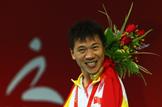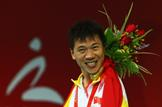
题目列表(包括答案和解析)

He Junquan is a Chinese swimmer and has won many Paralympic(残奥会) gold medals. Born in Jingmen, Hubei province, He Junquan was a healthy boy. But one day at the age of three, he climbed up to the high-voltage electricity(高压线) box and lost both of his arms forever. He became a disabled boy!
From then on he learnt to do everything with his feet: writing, eating, getting dressed and taking things. Seeing other pupils swimming in the river, he jumped in, too. Without arms, he suffered a lot in the river at the beginning. But he finally learnt to balance himself in water and could swim much faster than the other pupils. Once he even saved a little boy who fell into the water and couldn’t swim. His father was so happy to see that this son had a talent in swimming.
In 1995, He Junquan became a real swimmer. He practices swimming for more than four hours every day. Since 1996, he has won more than twelve gold medals of the world class. At the 2008 Summer Paralympics, he won a silver medal. Reporting on the competition at the 2008 Games, Will Swanton of the Sydney Morning Herald wrote:
“The Water Cube has been a sight for sore(气愤的) eyes. China’s He Junquan, with no arms, was leading the 50m backstroke(仰泳) final. … He came to the finish— and had to crash into the wall with his head. As he slowed down to lessen(减少) the impact(撞击力), Brazilian Daniel Dias hit the wall first with a hand. You’ve never heard a silence like it.”
【小题1】What happened to He Junquan when he was three?
| A.He climbed up the tree but failed onto the ground. |
| B.He saved a little boy who fell into the river and couldn’t swim. |
| C.He climbed up to the high-voltage electricity box and lost his two arms. |
| D.He began to practice swimming in the swimming pool with the other children. |
| A.With his feet. | B.With his mouth. |
| C.With his legs. | D.With his hands. |
| A.Only one. | B.Less than four. | C.About ten. | D.More than twelve. |
| A.He Junquan should not take part in the 2008 Games. |
| B.Daniel Dias didn’t hit the wall first at the 2008 Games. |
| C.The match was a little unfair for He Junquan because he had no arms. |
| D.He Junquan swam a little faster than Daniel Dias but he won a gold medal. |
| A.A Terrible Accident. | B.A Disabled Boy. |
| C.An Unforgettable Experience. | D.A Hero without Arms. |
| |||||||||||||||||||||||||||||||||||||||||||||||||||||||||||||||||||||||||

On a cold morning at a bus station, a man played six famous pieces of music for about an hour. During that time, about two thousand people went through the station, most of them were on their way to work.
3 minutes later: a middle-aged man noticed there was a musician playing. He slowed down, stopped for a few seconds and went away.
4 minutes later: the musician received his first dollar. A woman threw the money in the box and kept on walking without stopping.
6 minutes later: a young man stopped to listen to him. Then he looked at his watch and started to walk again.
10 minutes later: a 3-year-old boy stopped to look at the musician, but his mother took him away. Several other children did the same as the boy. And nearly all the parents took their children away.
45 minutes later: the musician kept on playing. Only 6 people stopped and stayed for a while. About 20 persons gave him money but left quickly.
After 1 hour, the musician finished playing. In the end, he collected $ 32. No one noticed that he had finished playing.
No one knew this, but the musician was Joshua Bell, one of the best musicians in the world. At that time, he played one of the most wonderful pieces ever written, with a very expensive violin.
If we do not have time to stop and listen to one of the best musicians in the world playing with the most beautiful violin, how many other things are we missing?
1.Joshua Bell played six famous pieces of music for ________ at a bus station.
A.half an hour B.an hour C.fifteen minutes D.a day
2.__________ gave the first dollar to Joshua Bell for his performance.
A.A mid-aged man B.A Young man C.A woman D.A 3-year-old boy
3.Nearly all the parents ________________ while they went past the musician.
A.took their children away B.threw the money into the box
C.stayed with their children listening D.looked at their watch
4.Joshua Bell was in fact ________________.
A.a very famous pianist B.a very popular singer
C.a very poor violinist D.a very famous violinist
On a cold morning at a bus station, a man played six famous pieces of music for about an hour. During that time, about two thousand people went through the station, most of them were on their way to work.
3 minutes later: a middle-aged man noticed there was a musician playing. He slowed down, stopped for a few seconds and went away.
4 minutes later: the musician received his first dollar. A woman threw the money in the box and kept on walking without stopping.
6 minutes later: a young man stopped to listen to him. Then he looked at his watch and started to walk again.
10 minutes later: a 3-year-old boy stopped to look at the musician, but his mother took him away. Several other children did the same as the boy. And nearly all the parents took their children away.
45 minutes later: the musician kept on playing. Only 6 people stopped and stayed for a while. About 20 persons gave him money but left quickly.
After 1 hour, the musician finished playing. In the end, he collected $ 32. No one noticed that he had finished playing.
No one knew this, but the musician was Joshua Bell, one of the best musicians in the world. At that time, he played one of the most wonderful pieces ever written, with a very expensive violin.
If we do not have time to stop and listen to one of the best musicians in the world playing with the most beautiful violin, how many other things are we missing?
【小题1】Joshua Bell played six famous pieces of music for ________ at a bus station.
| A.half an hour | B.an hour | C.fifteen minutes | D.a day |
| A.A mid-aged man | B.A Young man | C.A woman | D.A 3-year-old boy |
| A.took their children away | B.threw the money into the box |
| C.stayed with their children listening | D.looked at their watch |
| A.a very famous pianist | B.a very popular singer |
| C.a very poor violinist | D.a very famous violinist |
湖北省互联网违法和不良信息举报平台 | 网上有害信息举报专区 | 电信诈骗举报专区 | 涉历史虚无主义有害信息举报专区 | 涉企侵权举报专区
违法和不良信息举报电话:027-86699610 举报邮箱:58377363@163.com